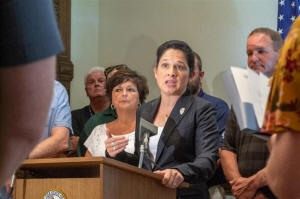Mendoza suggests Illinois due for credit upgrade
 Send a link to a friend
Send a link to a friend
[May 13, 2021]
By PETER HANCOCK
Capitol News Illinois
phancock@capitolnewsillinois.com
 SPRINGFIELD – Illinois Comptroller Susana
Mendoza is asking the nation’s three major credit rating agencies to
reconsider the state’s credit rating with an eye toward a possible
upgrade. SPRINGFIELD – Illinois Comptroller Susana
Mendoza is asking the nation’s three major credit rating agencies to
reconsider the state’s credit rating with an eye toward a possible
upgrade.
In an April 28 letter to executives at Moody’s Investors Service, S&P
Global Ratings and Fitch Ratings, Mendoza argued that Illinois has
virtually eliminated its backlog of past-due bills while keeping current
on its bond payments and pension obligations, all in the midst of a
global pandemic.
“Please be assured that my office is doing everything possible in
managing the current backlog of bills and addressing Illinois’ finances
head on,” Mendoza wrote. “The Office of Comptroller urges your agencies
to consider these positive factors and progress made paying down the
backlog when evaluating Illinois’ credit worthiness.”

Illinois currently has the lowest investment-grade credit rating
available from all three rating agencies, one notch above what is
considered “junk bond” status.
Mendoza wrote that letter on the same day her office announced that the
state’s bill backlog – actually, the sum total of all outstanding
vouchers waiting to be paid – had been decreased to just $3.5 billion.
According to the letter, the oldest outstanding commercial voucher at
that time was just two days old. The backlog was within the 30-day
billing cycle that is common in the business world, Mendoza’s office
said.
In fact, Mendoza said during an interview Tuesday that she believes the
state now needs to come up with another word besides “backlog.”
“The key statistic here is that right now we are up to date with all of
our commercial vouchers,” Mendoza said. “So there is no one waiting to
get paid in my office. There could still potentially be some people that
are waiting to get paid because their invoices might be at the agency
level and they just haven't sent them to us. But you're talking about a
minute group of people.”
Since Mendoza announced that the backlog had been paid down, the amount
of outstanding vouchers has fluctuated daily, roughly between $3.5 and
$4.5 billion. But she said the bulk of that is the result of interfund
borrowing – when the state transfers money from other funds into the
general revenue fund to meet short-term cash flow needs – as well as the
normal “ebb and flow” of daily business in state government.
Apart from those expenses, though, the state does have significant
short-term obligations coming due, including roughly $3.2 billion the
state borrowed from the Federal Reserve during the pandemic, plus
another $400 million borrowed from the state treasurer’s office.
[to top of second column]
|

Illinois Comptroller Susana Mendoza is pictured in her Capitol
office in 2019. (Capitol News Illinois file photo)

Both Mendoza and Gov. JB Pritzker had said in earlier
interviews that they wanted to use a portion of the roughly $8
billion in federal relief funds that Illinois expects to receive
through the recently-passed American Rescue Plan to pay off the
Federal Reserve loans. But new guidelines from the U.S. Treasury
Department that were released on Tuesday specifically prohibit using
those funds for “payment of interest or principal on outstanding
debt instruments, including, for example, short-term revenue or tax
anticipation notes, or other debt service costs.”
State Rep. Michael Zalewski, D-Riverside, who chairs the House
Revenue Committee, said in an interview Wednesday that he does not
believe the relief funds can be used to repay the Federal Reserve
and that any repayment plan will have to be “part of a broader
budget conversation.”
But Mendoza said in a statement Wednesday that she believes there
may be room to negotiate with Treasury on the use of those funds.
“The Dept. of the Treasury said it welcomes feedback to the interim
guidance on permitted uses of the stimulus funds,” she said in an
email statement. “(The Governor’s Office of Management and Budget)
and our office will be seeking to clarify with the Treasury that
guidance against using these funds to pay debts unrelated to
COVID-19 does not prevent their use for paying debts accrued for
spending related to COVID expenses. Our office has made clear that
stimulus funds will not be used to pay legacy costs such as
pensions.”
During a separate news conference Wednesday, Pritzker insisted the
state is committed to repaying the Federal Reserve loans one way or
another, but said he believes the state should be allowed to use the
relief funds for that purpose.

“Look, the federal government is sending us dollars and then telling
us that we can’t then send those dollars back to the federal
government to pay for the borrowing we took out last year. Clearly
it doesn’t make a lot of sense and so we’ve talked to the Treasury
Department about that,” he said.
Capitol News Illinois is a nonprofit, nonpartisan
news service covering state government and distributed to more than
400 newspapers statewide. It is funded primarily by the Illinois
Press Foundation and the Robert R. McCormick Foundation. |